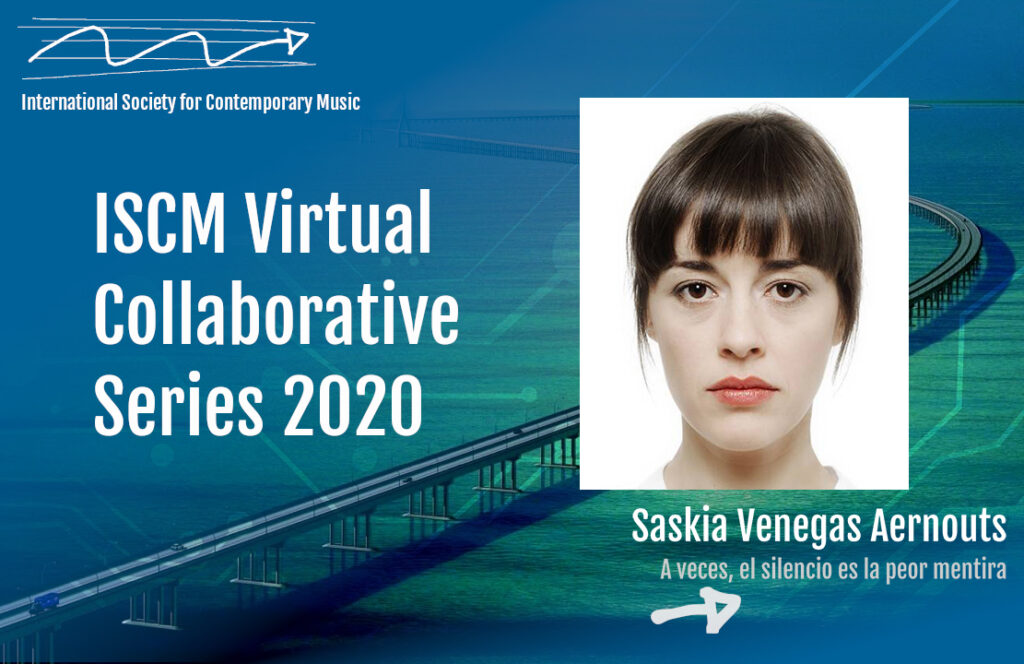Saskia Venegas Aernouts: A veces, el silencio es la peor mentira

(Submitted by ISCM – FLEMISH SECTION)
Saskia Venegas was born in Guecho in Spain in 1983 and has Spanish and Belgian nationality. Venegas studied violin at Codarts, Rotterdam with Christiaan Bor, Benzion Shamir and Gordan Nikolitch. After obtaining her bachelor’s degree she studied for a master’s degree in New Music Theatre with Michel Van der Aa, Arlon Luijten, Marcel Sijm, Titus Muizelaar, and Rob de Graaf, amongst others. She broadened her musical studies at the Royal Conservatoire of Antwerp where she studied composition with Wim Henderickx, Luc Van Hove, and Alain Craens obtaining her bachelor’s degree in 2016 and her master’s degree in 2018 with the highest distinction.
Venegas is profoundly interested in portraying and reflecting upon human social and political behaviour in her creations. Compositions like At the Aegean Shores, performed by the Antwerp Symphony Orchestra, was a narration of the horrors she witnessed while working in a refugee camp in Lesbos. Her ensemble piece A veces, el silencio es la peor mentira (Sometimes silence is the biggest lie), performed by Hermes Ensemble, is a reflection on the open wounds of her country and critique on the existence of the “Valley of the fallen”, a Catholic basilica and a monumental memorial where Spanish dictator Franco was buried (until October 2019). This work made her go further and investigate compositions of oppressed composers of the Spanish dictatorship. Her search of their lost names, biographies, and missing works gave birth to her project Spain’s silenced voices presented by Ensemble Oihua, an ensemble that she herself founded while being its artistic director. The performances were acted out in several Spanish theaters with the support of the Spanish ministry of justice. Her world view connected her with the famous Swiss theater director, journalist, essayist and lecturer Milo Rau, working as a composer in his last two theatre productions “Orestes in Mosul” (2019) and “Family” (2020).
A veces, el silencio es la peor mentira refers to the response of Spanish philosopher and theatre writer Miguel de Unamuno when he confronted one of Franco’s military commanders at the university of Salamanca at the beginning of the Spanish civil war. After that incident he was taken to house arrest and soon after he died. This sentence reflects what I believe to be the open wound of Spain, our unspoken and dark history and it’s yet to be condemned crimes. This piece is a programmatic story that reflects the feeling I had while visiting the “Basilica del Valle de los Caídos” , a huge church carved into a rock in which the dictator and thousands of unmanned bodies are buried (piled up into the construction of the walls). The path into this megalomaniac monument, its dark and endless corridor and the gigantic archangels that guard the dictator’s tomb left me speechless, cold and with a huge mixture between sadness and anger. The abrupt beginning resembles my first impression while standing in front of the entrance. The drone in A refers to the moment I passed through its door and I started walking through its corridor. The flute and clarinet represent the Gregorian songs I heard by the monks who were praying there. Slowly the path through the building is mixed with thoughts and references to the decades of oppression. The mezzo-soprano signs a melody inspired by a tune that refers to the mine workers and other political prisoners (whom carved this building in forced labor). Gradually her voice will be slowly swallowed by a rhythm of Seguirya, which will end up imposing itself upon the rest of the sonic construction of the piece.
Performed by the HERMESensemble
(Lien Haegeman, mezzosoprano | Karin de Fleyt, flute | Peter Merckx, clarinet | Wibert Aerts, violin | Marc Tooten, viola |
Stijn Saveniers, cello | Catharina Feyen, double bass | Geert Callaert, piano | Gaetan La Mela, percussion)
Benjamin Haemhouts, conductor

ISCM
